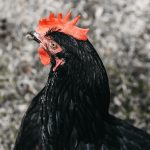In order to properly care for chickens during the winter months, it is essential to understand their specific needs during this time. Chickens are generally hardy animals, but they can be susceptible to cold temperatures and harsh weather conditions. During the winter, chickens require a warm and dry environment, access to fresh water, nutritious feed, and protection against frostbite and cold-related injuries. It is important to be aware of the signs of distress in chickens, such as lethargy, decreased egg production, and changes in behavior. By understanding the needs of winter chickens, you can ensure that they remain healthy and comfortable throughout the colder months.
Chickens are more resilient to cold temperatures than many people realize, but they still require proper care and attention during the winter. It is important to provide them with a warm and dry shelter, access to fresh water, and a well-balanced diet. Additionally, chickens may require additional heating and insulation measures to protect them from the cold. By understanding their specific needs during the winter, you can ensure that your chickens remain healthy and happy throughout the season.
Table of Contents
Providing Proper Shelter and Bedding
During the winter months, it is crucial to provide chickens with a warm and dry shelter to protect them from the cold and harsh weather conditions. The coop should be well-insulated and free from drafts, with adequate ventilation to prevent moisture buildup. Bedding such as straw or wood shavings should be used to provide insulation and keep the coop dry. It is important to regularly clean and replace the bedding to maintain a clean and healthy environment for the chickens.
In addition to providing a warm and dry shelter, it is important to ensure that the coop is predator-proof to protect the chickens from potential threats. This may involve reinforcing the coop with sturdy materials and securing doors and windows. By providing proper shelter and bedding for your chickens, you can help them stay warm and comfortable throughout the winter months.
Ensuring Access to Fresh Water
Access to fresh water is essential for chickens year-round, but it is especially important during the winter months when water sources may freeze. It is important to regularly check and refill water containers to ensure that chickens have access to clean and unfrozen water at all times. Heated waterers or adding a small amount of apple cider vinegar to the water can help prevent freezing. Additionally, it is important to monitor water consumption and be aware of any signs of dehydration in the chickens.
In addition to providing access to fresh water, it is important to ensure that the water containers are placed in a location where they will not freeze. This may involve using heated waterers or placing the containers in a sheltered area. By ensuring access to fresh water, you can help prevent dehydration and keep your chickens healthy throughout the winter.
Offering Nutritious and Well-Balanced Feed
A well-balanced diet is essential for chickens year-round, but it is especially important during the winter months when they require additional energy to stay warm. It is important to provide chickens with a nutritious feed that is high in protein and energy, such as a commercial layer feed or a mix of grains and seeds. Additionally, offering supplemental treats such as mealworms or scratch grains can help provide extra energy during the colder months.
In addition to providing nutritious feed, it is important to monitor the chickens’ food consumption and adjust their diet as needed. Chickens may require more feed during the winter to maintain their body temperature, so it is important to ensure that they have access to plenty of food at all times. By offering nutritious and well-balanced feed, you can help ensure that your chickens remain healthy and strong throughout the winter.
Chickens are susceptible to frostbite and cold-related injuries during the winter months, especially on their combs, wattles, and feet. It is important to monitor the chickens for signs of frostbite, such as discoloration or swelling, and take measures to protect them from the cold. This may involve applying petroleum jelly or a similar protective ointment to their combs and wattles, or providing them with a warm place to rest their feet.
In addition to protecting against frostbite, it is important to be aware of other cold-related injuries that chickens may experience during the winter. This may include respiratory issues or hypothermia, which can be caused by prolonged exposure to cold temperatures. By monitoring the chickens for signs of distress and taking measures to protect them from the cold, you can help prevent frostbite and other cold-related injuries.
Monitoring Health and Behavior
During the winter months, it is important to monitor the health and behavior of your chickens closely. Cold temperatures can put stress on their immune systems, making them more susceptible to illness. It is important to be aware of any changes in behavior or appearance, such as lethargy, decreased egg production, or changes in appetite. Additionally, it is important to regularly check for signs of illness or injury, such as sneezing, coughing, or limping.
In addition to monitoring their health, it is important to provide regular opportunities for exercise and mental stimulation for the chickens. This may involve providing them with access to an outdoor run or offering enrichment activities such as hanging treats or toys in their coop. By monitoring their health and behavior and providing opportunities for exercise and mental stimulation, you can help keep your chickens healthy and happy throughout the winter.
Implementing Additional Heating and Insulation Measures
In some cases, additional heating and insulation measures may be necessary to protect chickens from the cold during the winter months. This may involve using heat lamps or heated pads in the coop to provide extra warmth, especially for young or elderly chickens who may be more susceptible to cold temperatures. Additionally, adding insulation such as foam board or straw bales around the coop can help retain heat and protect against drafts.
In addition to providing additional heating and insulation measures, it is important to be aware of potential fire hazards associated with these methods. It is important to use heating devices safely and follow manufacturer’s instructions to prevent accidents or injuries. By implementing additional heating and insulation measures safely, you can help ensure that your chickens remain warm and comfortable throughout the winter.
In conclusion, caring for chickens during the winter months requires an understanding of their specific needs during this time. By providing proper shelter and bedding, ensuring access to fresh water, offering nutritious feed, protecting against frostbite and cold-related injuries, monitoring health and behavior, and implementing additional heating and insulation measures when necessary, you can help ensure that your chickens remain healthy and comfortable throughout the colder months. With proper care and attention, your chickens can thrive even in the coldest of winters.
Meet Walter, the feathered-friend fanatic of Florida! Nestled in the sunshine state, Walter struts through life with his feathered companions, clucking his way to happiness. With a coop that’s fancier than a five-star hotel, he’s the Don Juan of the chicken world. When he’s not teaching his hens to do the cha-cha, you’ll find him in a heated debate with his prized rooster, Sir Clucks-a-Lot. Walter’s poultry passion is no yolk; he’s the sunny-side-up guy you never knew you needed in your flock of friends!







